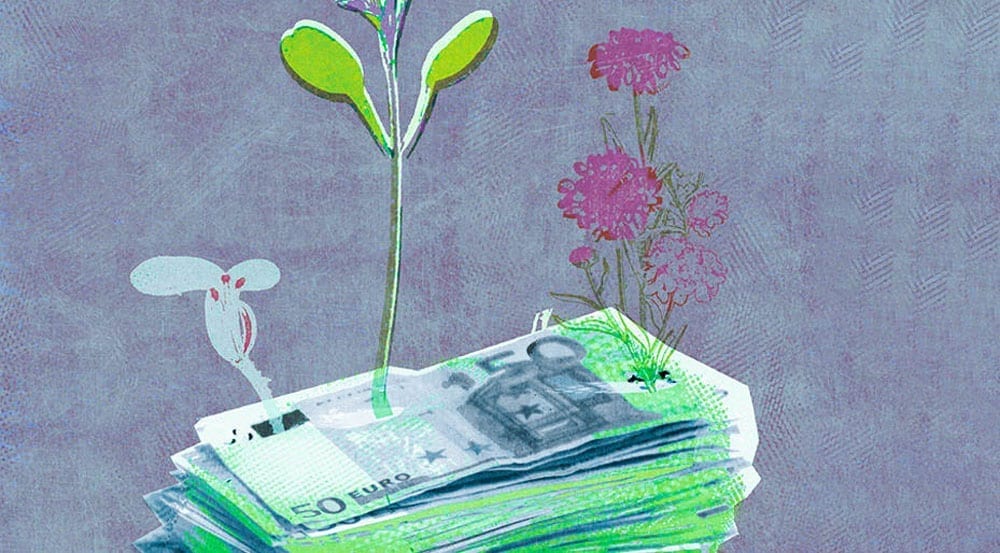Beyond the choke hold of growth: post-growth or radical degrowth?—Tim Jackson in conversation with Giorgos Kallis
The 2018 Post-Growth conference at the European Parliament marked a milestone in the history of the post-growth debate. In this interview, Riccardo Mastini discusses the possibilities and challenges for imagining a world beyond growth with two key post-growth thinkers—Tim Jackson and Giorgos Kallis. (The interview was conducted for the Green European Journal, and was originally published in two parts.)

The Politics of Post-Growth
Riccardo Mastini: We are here in the European Parliament talking about post-growth with academics such as yourselves, but more surprisingly with officials from the European Commission and MEPs. As longstanding thinkers of a world beyond growth where does the battle to imagine a world without growth stand today?
Tim Jackson: It’s still a difficult debate, but not as difficult as it has been. It’s interesting to think of it in historical terms, kicking off with Robert Kennedy’s speech at the University of Kansas in 1968. In that speech, Robert Kennedy wasn’t just questioning GDP as an indicator, he also talked about what makes life worthwhile and what we mean by social progress. That speech is significant in its philosophical and social content and its vision of a different kind of society. In the 50 years between that speech and today much has changed, including in the measurements sphere. The Stiglitz Commission published its report on measurement of social progress in 2009, coinciding almost exactly with the financial crisis. Around the same time, the degrowth movement was beginning to emerge. Over the last 10 years, the conversation has been richer, deeper, and has increasingly involved civil society and resonated with the public.
Yet the debate still doesn’t quite reach political ears in a comfortable way and that’s what is slowly beginning to change. When I wrote Prosperity Without Growth 10 years ago, I was reporting to the British Prime Minister. But as a whole the government wanted it to go away. The report was seen as too uncomfortable and as coming at the wrong time. It challenged the task in hand, which the government saw as getting growth back again after the financial crisis. Today however, it’s increasingly possible to have those conversations in parliament. The virtue of what we have done in today’s conference organised by Philippe Lamberts is to create a space in a parliamentary context to have that conversation about the growth-based economy and about a post-growth vision.
Riccardo Mastini: How much progress has degrowth as a current of thought made in provoking a wider societal debate?
Giorgos Kallis: Whenever I step out of the Twitter echo chamber and of my academic circles, I am reminded that we still have a long way to go and have only just begun to open some space for conversations about growth and degrowth. But I take strength from the fact that we are producing more and better knowledge and are engaging more people in our research. We’re not just showing that we are overshooting ecological limits, but are exploring alternatives too. The younger minds that join the degrowth discussions are excited and bring fresh ideas. At the degrowth conferences, I see energy and new people – both researchers and activists – putting their bodies on the line to stop fossil fuel extraction whilst thinking seriously about how we can live differently and the politics to get us there. In the political sphere, some small changes give me hope. For example, I hear that the main opposition in the UK, the Labour Party, is open to contemplating a narrative not based around growth and that young people in the Democratic Party backing Bernie Sanders in the US discuss eco-socialist ideas. So I can see some potential openings.
Would that be an opening to the extent of a political candidate or social movement making degrowth its primary issue? No, I never thought that degrowth would be a movement like the workers’ movement, with political parties arguing for degrowth and elected on degrowth platforms. A successful political movement is going to be about many different aspects of social justice and economic transformation, not just degrowth. My aspiration is that degrowth ideas are taken up by broader social and political movements and become common sense for many people, possibly even people in power.
In one sense we are in worse place than we were in the 1970s, and in another sense we’re better off. In the early 1970s, the European Commission’s President was Sicco Mansholt, who had read The Limits to Growth and who even called for zero growth in Europe. Jimmy Carter in the US was also open to the idea of limits to growth and the need for frugal life. However, after the second oil crisis and the ensuing recession, Ronald Reagan decimated Carter and dismissed any idea of limits so that they went completely off the political radar in the 1980s. Even the Greens came around to ‘sustainable development’ and ‘ecological modernisation’, though of course this led nowhere. While degrowth has not made as big a headway to the policy sphere today, its grassroots are bigger and will not just go away. The conversation was even kept alive through financial crisis and will keep on going and growing.
Riccardo Mastini: Doesn’t the rise of right-wing neoliberalism threaten this progress and potential of the degrowth movement?
Giorgos Kallis: It is easy to be pessimistic nowadays. Here at the European Parliament, we are debating reasonably with people who worry about climate change, though they might still think green growth is possible. But what about the people who openly deny climate change and want to pursue growth at all costs for the benefit of the rich? Trump and the many various hard-right governments around the world represent a backlash of climate denial and the drive for growth. I would include Poland, Hungary, the Philippines, India, Turkey, Australia, and now Brazil too. Environmental activists are murdered with impunity and terrorism laws are used against environmental protests. We have minor openings discussing degrowth or ecosocialism, but there is also a hardening and an acceleration of the opposite pole and this is frightening.
Riccardo Mastini: Tim, your report on growth came out during the financial crisis when everybody was desperate for recovery and renewed growth. Today, if we look at the US economy under Donald Trump, growth is back, at the expense of the environment, public finances, and labour rights, but questioning it is still difficult. When is it easier to talk about growth: when you have it or when you don’t?
Tim Jackson: Just before the financial crisis when we were deciding to conduct the study that later became Prosperity Without Growth, I had a conversation with one of Gordon Brown’s advisors at the Treasury and he said to me, “Actually, I think we’ve got growth licked. We know how to keep growth growing. Inflation is stable. Government finances are stable. Debt is below 40 per cent. This is a good time to talk about going beyond growth-based economy.” Of course, actually we hadn’t got growth licked. We didn’t know the fragilities that were emerging underneath GDP growth in terms of debt, division between rich and poor, and between those who own assets and those who held that debt. But these fragilities were what brought the entire equation down.
The economy undid itself and at the time I thought it was accidental, that it undid itself because we weren’t paying attention to the right things. But in retrospect I think that it was much more fundamental and that we actually destroyed growth from within. Because it was the financial architecture of that growth-based system that motivated the extension of credit, the looseness of monetary policy, and the expansion of balance sheets to the point of instability. The ‘growth fetish’ gave us both the crisis and now the motivation for talking about what might happen beyond the growth-based system.
That’s why this is a really good time to talk about post-growth. It’s not just environmental limits, it’s the growth-based system itself that is running into its own limits. That is the source of the dysfunctionality that we see around us. It’s beginning to dawn on mainstream economists that the growth that we thought we could get was only ever achieved in unsustainable ways – not only in terms of climate change and carbon emissions, but its financial conditions too.
Riccardo Mastini: Even as the contradictions of growth build up, hasn’t post-growth not been taken up simply because no social actor has an interest in it?
Tim Jackson: It’s quite reasonable to say that no social actor has an interest in post-growth, but only if you think of it in a very simplistic way. If you think we’re saying to rich people, “Sorry guys, you’re not going to be as rich as you were” and to poor people, “Sorry, there’s no more trickle-down effect”, then it’s clear that neither the poor nor the rich would vote for a post-growth economy. But there’s another way of thinking about it, which is that inequality between rich and poor, the instability that inequality causes, and the further instability of a financial system created to push for growth against fundamental forces such as declining labour productivity, simply end up making the whole system and its politics more unstable. Then you realise every social actor has an interest in post-growth. These factors turn the idea that ‘turkeys are not going to vote for Christmas’ on its head.
Riccardo Mastini: But if you look at different political parties in Europe, all across the board, post-growth has not been really picked up.
Giorgos Kallis: This is true, but this does not mean that it would be impossible. Some Green and radical Left parties advocate post-growth policies. Barcelona en Comú, the local party that runs Barcelona city council, is a good example. The word ‘growth’ did not feature once in their electoral programme and they nevertheless won. Of course, it’s easier for a local party that has much less responsibility for the economy than those at the national level.But I don’t think that for a potential green-left political movement or coalition it would be impossible to avoid talking about growth or to put forward a programme of ‘prosperity without growth’. Many left and green voters already don’t want to hear about growth. Whether such a coalition could win elections, or whether if it won it would be able to survive a drop in GDP, is a harder question.
Tim Jackson: Alternativet in Denmark, who have quite a big presence in Parliament, are very explicit about their antipathy to growth. The Greens, certainly in the UK, have adopted post-growth now. But it is tough. The one thing that would make it not so tough would be if there just wasn’t any growth anymore, which is this new argument.
Riccardo Mastini: Zooming out from national politics, what would a post-growth world mean for the international system, which sees states trade and compete with one another?
Giorgos Kallis: That’s the question we have thought about least in the degrowth movement because it’s the most difficult. A lot of our thinking tends to look at how one nation could be made stable without growth. But it is true that we live in a globalised economy characterised by competition. Trade is not the first thing that concerns me; I am thinking more about international competition and geopolitics. Geopolitics has its own logic. The power dynamics of the military sphere and economic domination play out with a logic of competition different to that of capitalist competition. Vladimir Putin wants a sphere of influence for Russia to export oil and to strengthen its economy. China wants to build the Belt Road. The United States wants to control oil supplies. Big dynamics of growth come from this competition, which is also competition over military dominance. To think that somehow these power dynamics will wither away by themselves might be too romantic.
Reflecting on the case of Greece, the other problem is that in a globalised world it’s difficult to go your own way. Imagine a scenario where a government from a small country assumes power and says “You know what, we are not interested in growth and are going to try and do without it.” The next day foreign capital would leave the country, triggering a destabilising snowball effect of investment freezes, interest rates rises on debt, and capital flight. Managing the economy to achieve one per cent less GDP might not be that difficult in theory, but the impacts of these secondary effects are easy to underestimate. Greece had little freedom given its public debt and need for borrowing. It could of course have refused to pay, but this would have had other difficult repercussions too.
Especially in the European Union, no country can act on its own any more, even if it wanted to. If the degrowth or post-growth transition is to start, it will have to start in one of the core countries: the US, Germany, England. Post-growth policies have to take root in countries that have the political power at the global level to do things differently while protecting themselves economically.
Riccardo Mastini: What’s the role of the European Union in this respect?
Giorgos Kallis: The European Union is a huge question. The European Union is more like an expression of power. Right now its policies and constitutional constraints are geared towards competition, growth, and so-called innovation. But at the end of the day, the European Union follows what the powerful states of the European Union want. If Germany and France go one direction, it influences the rest of the union. Right now the EU is an obstacle if we think about post-growth policies. Nationalising the transport sector clashes with EU competition rules for example. For some of the policies that we argue for, you need more public sector and less private sector so there is a clear clash with the direction of the EU. Then within the euro, there are certain obligations to make sure economies are geared to growth and managed broadly speaking along neo-liberal principles. The Troika asked Greece to make working hours more flexible and allow work on the weekend. Do you think they would ever concede working time reduction?
Riccardo Mastini: Tim, how would you paint a picture of life in a post-growth world? What are the main traits of a post-growth society?
Tim Jackson: There are opportunities for a richer, more convivial, more altruistic, and more egalitarian society; a society that is fairer, more fulfilling, and more creative. It’s a world that doesn’t necessarily look exactly like News from Nowhere by William Morris, but it has some of those characteristics. People are integrated in that society and work is part of participation in that society. But quality and creativity are the values that frame the tasks people do, not productivity and output. It’s a place where the opportunities for us as human beings to flourish are very different.
We think about the capitalist economy and the democracies of advanced economies as being about freedom, but that’s a particular kind of freedom: the freedom to choose from different products on a supermarket shelf; the freedom to do whatever we want in our free time whatever the impact on the environment; or the freedom to move to a more destructive or powerful job through our career. In trying to achieve those freedoms, we’ve cut down certain others: the freedom to care about each other, the freedom to interact, the freedom to have time to contemplate, the freedom to work on ourselves, or the freedom to have a full and creative life supported by our society and community.
You probably want me to answer questions like “Will I still have a mobile phone?” But I honestly have no answer to that. I suspect, yes. Because that technology empowers our human desire to communicate, to flourish, to access information, and to develop. But our idea of what it means to live and to learn will not be constrained by that view that we can only do certain things through technology. Instead, we will regain another freedom: the freedom to re-enchant the world and to reinvigorate our capabilities to be human beings.
. . .

Post-growth or radical degrowth?
Riccardo Mastini: Growth seems to be a common denominator across the political spectrum from liberals and socialists to conservatives and even some greens. Its importance can be traced back to the Enlightenment. Why is growth such a shared and sacred goal that has shaped our imaginary for centuries?
Giorgos Kallis: Simply put, growth stabilises capitalism. Capitalism is a system premised on the logic of growth: profits are made and then invested to make more profit. It’s the only expansionary socio-economic system in the history of humanity; other civilizations were more or less stable. And growth is not an Enlightenment idea. The idea that a nation needs to achieve two or three per cent growth each year emerged quite recently in the 20th-century context of two world wars, the Great Depression, and the Cold War.
The idea of growth may have some roots in Enlightenment thought, but it is not necessarily a direct evolution. The Greek-French philosopher Cornelius Castoriadis, who is quite influential in the French degrowth debate, argues that the Enlightenment involved two separate projects. On the one hand, we have the Enlightenment quest for autonomy, our right to question our institutions and a refusal to accept truths as handed down from tradition or the gods. This questioning is at the heart of what we understand as democracy. On the other hand, there was the drive for constant conquest of nature and expansion, the project of capitalism. Yet capitalism and the project of subduing nature cannot be questioned, running contrary to the democratic ideal. So while we typically think of democracy and capitalism as one and the same, Castoriadis claims that these two projects are ultimately incompatible.
I’m all for the Enlightenment and questioning things, for reason and reflection, but that does not need to be tied to the impetus of constant growth. In many ways, the two aspects are in conflict. An obvious conflict is that nowadays you cannot really question growth. Consider Steven Pinker. Supposedly he stands for Enlightenment and reason, and those of us who question his claim that the world is constantly improving are biased, politically motivated ideologues. Yet you read his book Enlightenment Now and it is raging ideology. Reading the chapter on environmentalism, I couldn’t believe my eyes. The chapter starts by putting Pope Francis, Naomi Klein, and Al Gore in same basket as Nazis and ecoterrorists. You see here how the defence of the capitalist system in the name of reason actually goes against reason itself.
Riccardo Mastini: Tim, you have argued that the defence of growth in the abstract can verge on the religious.
Tim Jackson: One of the Enlightenment’s projects was the idea of social progress, which gained particular importance because of the Enlightenment’s rationalist attack on conventional religion. In a world in which there is no heaven or God, social progress has to be cashed out in material terms of the here and now. So as we moved from an enchanted to a disenchanted world, our economic structures became more and more important and economics emerged as the dominant way to think about social progress.
The classical economists collapsed the vision for expanding social progress, the greatest happiness for the greatest number, into a fixed system represented by financial flows. Happiness and well-being became economised and, after the challenges of the Great Depression and the Second World War, enshrined through financial architecture and the accounting framework of gross domestic product. The religiosity with which we now think about growth and GDP is directly linked to religion itself, because we no longer have God to save us.
Riccardo Mastini: Many worry that questioning economic growth implies limiting human achievement and that, in a disenchanted world, the only thing we have left is expansion of the human being. Shouldn’t we be emphasising the need for a different, qualitative growth rather than pushing against growth?
Tim Jackson: I don’t disagree with that, there is need for enchantment. Some of that enchantment can be seen as growth or development in personal terms. But it’s interesting how it is framed as, “Can we please keep the growth word at all costs?” We need to be a little bit sceptical of that.
Giorgos Kallis: There is an underlying ideology at work in the idea of qualitative growth that worries me. It’s a very Western contemporary way of thinking that holds not that things have to be good, nice or beautiful, but that they must be in a constant mode of expansion. This idea is not innately human and many civilizations before ours did not share it. Qualitative growth reproduces this idea of constant expansion. But the term does not really make sense because quality does not grow. Quality changes and evolves but only a quantity grows. Sure, we want more of certain things such as windmills or parks in cities. But ’more’ is not the same as growth, which means constant and perpetual expansion at a compound rate. This idea of perpetual expansion, which comes from economics, has infiltrated our subconscious. Take the seemingly innocuous notion of ‘personal growth’. In what meaningful sense does a person grow? Are you three times better or kinder today than 10 years ago? Your personality flourishes, evolves, matures, changes, but it doesn’t grow!
Riccardo Mastini: Degrowth evolved in part as a critique of economic reasoning. Giorgos, you argue for radical degrowth, whereas Tim, you focus more on a world without growth. What is the difference between the two perspectives?
Tim Jackson: My emphasis is not so much on ‘without growth’ as ‘prosperity without growth’. I look to tease apart prosperity and growth and say that they are different. Economic growth may at times be the appropriate means to achieve prosperity, but today we have moved beyond that. Growth has reached limits imposed not by us, not by God, but by the reality of a finite planet and fragile ecosystems.
When I was working on the report for the Sustainable Development Commission, which eventually became Prosperity Without Growth, the degrowth movement was also emerging with the First International Degrowth Conference in Paris in 2008. I went to the conference because I wanted an answer to what seems to me the most difficult question of all: how do you make your economy work when it isn’t growing anymore? I really got along with the people at the conference because we shared the same vision of a world not about productivism, output or consumption but about quality of life, the social world, and creativity. But one thing I did not find at the conference was a structured, possibly even conventional, way of looking at the economy and how it functions. To my knowledge, the majority vision within the degrowth community is that we have to throw economics away because it has corrupted our imaginary and bounded our thinking through institutionalised rationality.
Though I have some sympathy for that view, to make any progress, we have to understand and reform existing economic institutions. That’s a profoundly economic task and a constructed task. It has its eyes on this vision of a beautiful landscape in which we are freed from the bounds of consumerism and capitalism, but it actually looks to build the alternative structures that will take us from here to there without sliding into dystopia.
Giorgos Kallis: The creative aspect of the degrowth community is this contradictory tension between a radical critique of economic reasoning and at the same time a willingness to engage with economic models and propose policies. In my latest book, Degrowth, I try to do both. There is plenty of utopian thinking about what a degrowth world could look like and the flaws of economic reasoning, but I also put forward concrete proposals such as working-time reduction. I am inspired here by André Gorz who balanced both, writing the Critique of Economic Reason while also advocating working-time reduction through the use of economic arguments.
I am equally fine with using the term ‘without growth’ rather than degrowth, depending on the context. When Research & Degrowth wrote an op-ed presenting 10 policy proposals for the 2015 Spanish elections, we did not use the phrase ‘degrowth’ but talked instead of prospering without growth though we presented much the same policies. Politically speaking, the first step is to break with the idea that a winning political agenda must include economic growth. ‘Prosperity without growth’ helps in that. But analytically, the term degrowth is more consistent. If we take the common premise of ecological economics that the economy is material, then I cannot see how we can maintain that an ecologically sustainable economy, decarbonised and which uses fewer materials, wouldn’t also be much smaller.
I understand, to a certain extent, the tactical approach of not using the term degrowth but the numbers don’t square. Furthermore, what the term degrowth does is show that there is a conflict. If by ‘without growth’, we understand that we can implement the right policies for sustainability and just wait and see what happens to growth, then this will not be enough. We have to combat the ideology of growth; it won’t disappear just by ignoring it.
Riccardo Mastini: Tim, would you agree that in some form degrowth is necessary?
Tim Jackson: I don’t suggest that we should head towards some steady zero-growth economy. In the poorest parts of the world, there will need to be growth and that means that in others there will need to be contraction. The main difference I have with, at least part of, the degrowth community is that while I want to throw away growth-based economics, I do not want to throw away economic thinking. I have some sympathy with the critique that says our entire world and language has been captured by economics, but I don’t see how we can escape from that because we face what is essentially an economic challenge.
Giorgos Kallis: We should not throw away economics, but there are certain traps that lie within economistic thought. Accepting the Western idea that certain human development standards are superior regardless of the cultural context is one risk. I would agree with Tim that back at the First International Degrowth Conference in 2008 a wholesale rejection of economics might have been prevalent among some people there, but this is not the case anymore. Our conferences are now much bigger and more diverse. Some people focus on economic modelling, while others on philosophy and discourse. Of course, not everyone agrees with one another – some might think that economic models are reproducing the dominant way of thinking, others that they are useful for thinking practically about how to manage without growth. The important thing is that the degrowth community is not closing itself up or keeping economics, or any other discipline for that matter, out.
Riccardo Mastini: What about capitalism? Can capitalism accommodate the end of growth?
Giorgos Kallis: Growth is necessary for the stability of capitalism, but that doesn’t mean you cannot have capitalism without growth. It would just be an ugly capitalism. Without growth, you are left with a shrinking pie to redistribute. Under capitalism, this redistribution will most likely be in favour of those with more power. Stagnation under capitalism leads to exploding debt, and in the end austerity to protect profit, as in Greece.
At the same time, I’m not the type of socialist who makes an abstract argument that first we have to get rid of capitalism for something better to appear. We need to make clear proposals and pursue and push reforms starting from where we are now. But sure, if all the reforms people like us propose were to be implemented, a system that could accommodate such reforms would not be capitalist in any meaningful sense of the term.
Riccardo Mastini: Can you imagine a prosperous, sustainable, just and yet still capitalist future?
Tim Jackson: Capitalism is about ownership. In our current form of capitalism, ownership is unevenly distributed. When combined with the pursuit of profit as a motive, it creates expansionary tendencies, with all their associated environmental damage, and rising inequalities. If you define capitalism as simply expansion, which we know will ultimately destroy the planet, then yes, of course, we have to do away with it. But I think the real question is about social inequality. Can the capitalist model, particularly in a contracting economy or one at a slower rate of growth, redistribute to allow for an equitable and sustainable future? At the moment the institutions of capitalism are fundamentally opposed to that. The distribution of assets is skewed. The politics of ownership is skewed. The rights of workers are given less importance than the rights of the owners of capital. If things stay so skewed then it is clear that we cannot achieve both an equitable society and a declining economy.
How much would capitalism have to change? You certainly have to change the pattern of ownership and have more distribution and workers’ rights. The rule of thumb that says that wage growth goes with labour productivity growth would have to go because we may not have labour productivity growth anymore. It would represent a fundamental change in the social contract as circumscribed over the last 40 years by a particular form of capitalism. That form of capitalism would have to go.



